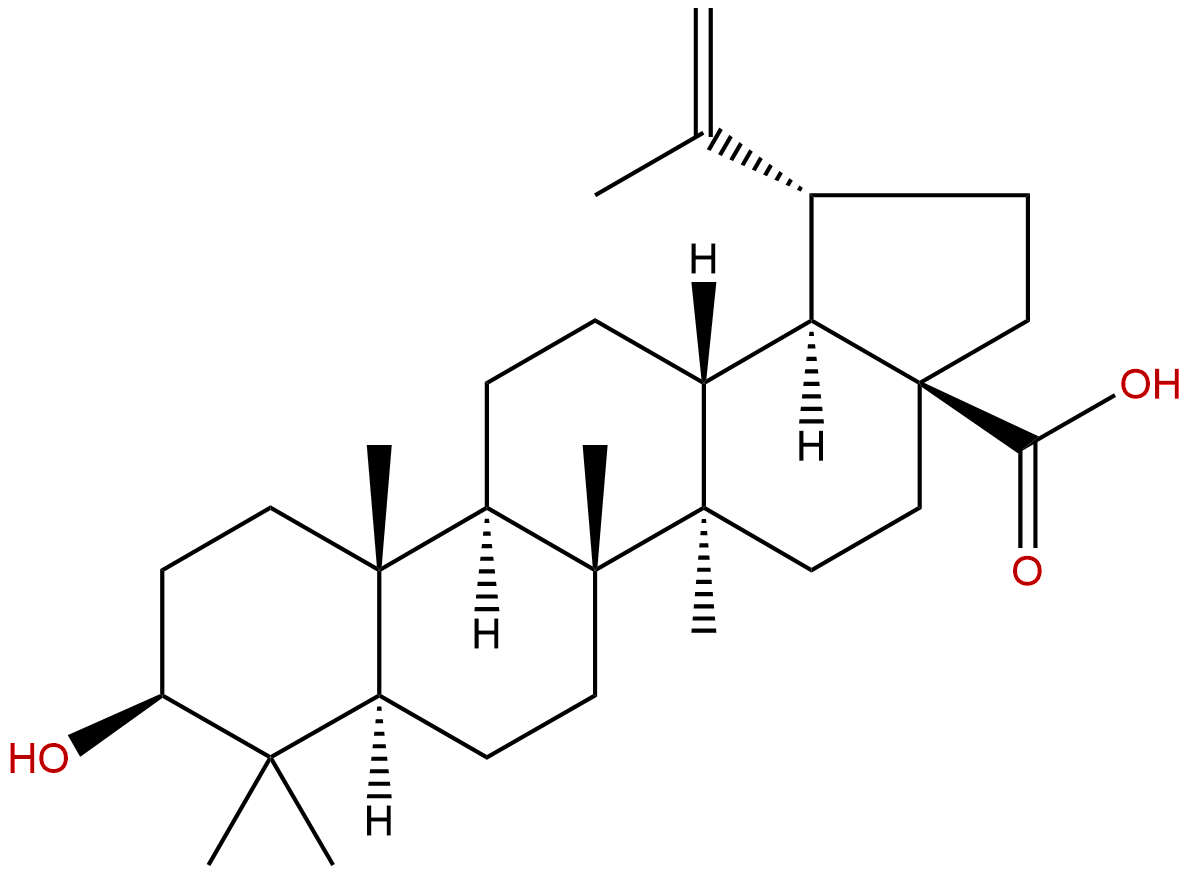
Betulinic acidCAS No.:472-15-1
|
||||||||||
 |
|
|
||||||||

| Catalogue No.: | BP0271 |
| Formula: | C30H48O3 |
| Mol Weight: | 456.711 |
Product name: Betulinic acid
Synonym name: Melaleucin; Mairin; Gratiolone; Platanol; Platanolic acid; Betulic acid
Catalogue No.: BP0271
Cas No.: 472-15-1
Formula: C30H48O3
Mol Weight: 456.711
Botanical Source: Betula platyphylla Suk.
Physical Description:
Type of Compound: Triterpenoids
Purity: 95%~99%
Analysis Method: HPLC-DAD or/and HPLC-ELSD
Identification Method: Mass, NMR
Packing: Brown vial or HDPE plastic bottle
Storage: Store in a well closed container, protected from air and light. Put into refrigerate or freeze for long term storage.
Whenever possible, you should prepare and use solutions on the same day. However, if you need to make up stock solutions in advance, we recommend that you store the solution as aliquots in tightly sealed vials at -20℃. Generally, these will be useable for up to two weeks.
The product could be supplied from milligrams to grams
Inquire for bulk scale.
Description:
Betulinic acid is a natural pentacyclic triterpenoid, acts as a eukaryotic topoisomerase I inhibitor, with an IC50 of 5 μM, and possesses anti-HIV, anti-malarial, immunomodulatory, anti-inflammatory and anti-tumor properties.Betulinic acid is a selective inducer of apoptosis in tumor cells, it inhibits activation of NF-kappaB and NF-kappaB-regulated gene expression induced by carcinogens and inflammatory stimuli.
References:
Toxicol Appl Pharmacol. 2014 Mar 1;275(2):152-62.
Betulinic acid, a bioactive pentacyclic triterpenoid, inhibits skeletal-related events induced by breast cancer bone metastases and treatment.
The present study provides evidence on the protective and therapeutic potential of Betulinic acid on cancer-associated bone diseases. Betulinic acid is a naturally occurring triterpenoid with the beneficial activity to limit the progression and severity of cancer, diabetes, cardiovascular diseases, atherosclerosis, and obesity.
METHODS AND RESULTS:
We first investigated its effect on breast cancer cells, osteoblastic cells, and osteoclasts in the vicious cycle of osteolytic bone metastasis. Betulinic acid reduced cell viability and the production of parathyroid hormone-related protein (PTHrP), a major osteolytic factor, in MDA-MB-231 human metastatic breast cancer cells stimulated with or without tumor growth factor-β. Betulinic acidblocked an increase in the receptor activator of nuclear factor-kappa B ligand (RANKL)/osteoprotegerin ratio by downregulating RANKL protein expression in PTHrP-treated human osteoblastic cells. In addition, Betulinic acid inhibited RANKL-induced osteoclastogenesis in murine bone marrow macrophages and decreased the production of resorbed area in plates with a bone biomimetic synthetic surface by suppressing the secretion of matrix metalloproteinase (MMP)-2, MMP-9, and cathepsin K in RANKL-induced osteoclasts. Furthermore, oral administration of Betulinic acidinhibited bone loss in mice intra-tibially inoculated with breast cancer cells and in ovariectomized mice causing estrogen deprivation, as supported by the restored bone morphometric parameters and serum bone turnover markers.
CONCLUSIONS:
Taken together, these findings suggest that Betulinic acid may have the potential to prevent bone loss in patients with bone metastases and cancer treatment-induced estrogen deficiency.
Appl Microbiol Biotechnol. 2014 Apr;98(7):3081-9.
Increase of betulinic acid production in Saccharomyces cerevisiae by balancing fatty acids and betulinic acid forming pathways.
Betulinic acid is a plant-based triterpenoid that has been recognized for its antitumor and anti-HIV activities. The level of Betulinic acid in its natural hosts is extremely low.
METHODS AND RESULTS:
In the present study, we constructed Betulinic acid biosynthetic pathway in Saccharomyces cerevisiae by metabolic engineering. Given the Betulinic acid forming pathways sharing the common substrate acetyl-CoA with fatty acid synthesis, the metabolic fluxes between the two pathways were varied by changing gene expressions, and their effects on Betulinic acid production were investigated. We constructed nine S. cerevisiae strains representing nine combinations of the flux distributions between Betulinic acid and fatty acid pathways. Our results demonstrated that it was possible to improve the Betulinic acid production in S. cerevisiae while keeping a desirable growth phenotype by optimally balancing the carbon fluxes of the two pathways. Through modulating the expressions of the key genes on Betulinic acid and fatty acid pathways, the difference in Betulinic acid yield varied largely in the range of 0.01-1.92 mg L(-1) OD(-1).
CONCLUSIONS:
The metabolic engineering approach used in this study could be extended for synthesizing other triterpenoids in S. cerevisiae.
HPLC of Betulinic acid
